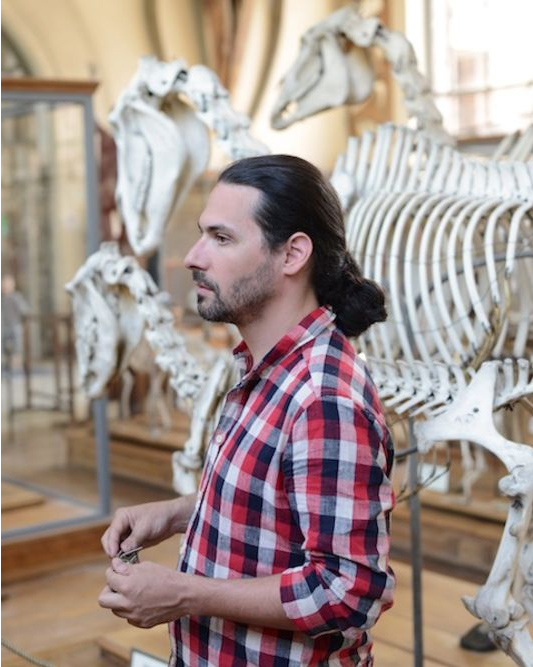
Contact
Email : ludovic.orlando@univ-tlse3.fr
Phone : 00 33 6 18 27 95 10
Skype : lorlando1369 | Twitter : LudovicLorlando
Researcher ID A-8932-2013
Orcid ID : 0000-0003-3936-1850
Google Scholar
Biosketch (CV)
Ludovic is a former student from the Ecole Normale Supérieure of Lyon (1996-2000), one of the top-5 French universities. First trained as a molecular biologist, he soon became interested in applying computational techniques to DNA sequence data. He graduated in molecular genetics from the Univ of Lyon, France in 2003, twenty years after the first ancient DNA molecule was sequenced. He was appointed as a permanent Associate Professor at ENS Lyon, where he lectured and performed research between 2005 and 2010. He started his own research group in 2010 at the Centre for GeoGenetics, Univ of Copenhagen, Denmark, where he was appointed as a full Professor in ‘Molecular Archaeology’ until 2020. He became a CNRS research director in 2016. He founded the Centre for Anthropobiology and Genomics (CAGT) in 2020, and as acted as its director since. He is also the head of the AnimalFarm CNRS International Research Programme, grouping together 4 leading ancient DNA labs at Univ of Oxfort, Trinity College Dublin, and LMU Munich, all focused on the reconstruction of the domestication history of animal domestic species.
Amongst his early career achievements feature (1) the sequencing of the first Middle Pleistocene genome, (2) the characterization of the first ancient epigenome, and (3) the identification of the horse and donkey domestication homelands.
He has been part of several organizing and scientific boards of international meetings, including for the Society of Molecular Biology and Evolution, the International Symposium on Biomolecular Archaeology, the International Union for Quaternary Research and the International Union of the Protohistoric and Prehistoric Sciences. He has been an Academic Editor and/or Editor-in-Chief for multiple scientific journals, including PLoS One, Scientific Reports, Peer J and STAR. He published 200+ scientific research articles and several books. He took part of several national research committees, including for the French National Research Agency (ANR) (2012 and 2013), the ‘Institut Universitaire de France’ (2015 and 2016), INRAE Genomics (2020-) and the Scientific Advisory Board of France Génomique (2021-). His research has received multiple national and international funding, including from multiple Marie-Curie programmes, and two prestigious grants from the European Research Council (CoG PEGASUS, and SyG Horsepower). He was awarded the CNRS Silver Medal in 2023 « for the originality, quality, and importance of (his) work, which is recognised at national and international level. »
Selected Invited Seminars (full list)
- September 12th 2023: Terracotta Army Museum. Xi’an, China.
- July 12th 2023: Hilgendorf Lecture. Tuebingen, Germany.
- May 11th 2023: Center for PaleoGenomics. Stockholm, Sweden.
- December 13th 2022: Harrison Lecture, Cornell University. Ithaca, USA.
- July 25th 2022: Havemeyer 13th International Horse Genome Workshop. Ithaca, USA.
- January 11th 2022: Plenary Talk. In: Plant and Animal Genomics XXIX. San Diego, USA.
Selected Publications (full list)
- Taylor et al. 2023. 2023. Early dispersal of domestic horses into the Great Plains and northern Rockies. Science 379:1316-1323.
- Todd et al. 2022. The genomic history and global expansion of domestic donkeys. Science 377:1172-80.
- Librado et al. 2021. The origins and spread of domestic horses from the Western Eurasian steppes. Nature 598:634-640.
- Fages et al. 2019. Tracking five millennia of horse management with extensive ancient genome time series. Cell 177:1419-35.
- Gaunitz et al. 2018. Ancient genomes revisit the ancestry of domestic and Przewalski’s horses. Science 360:111-14.